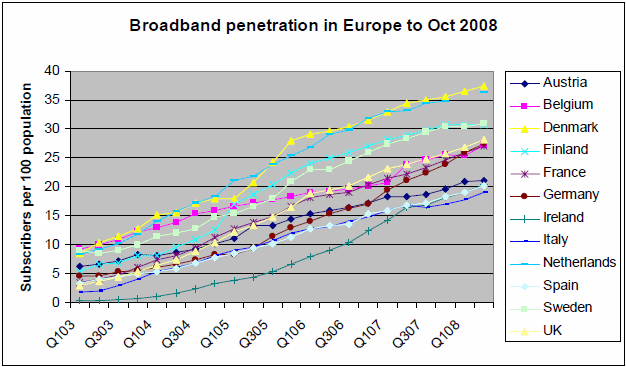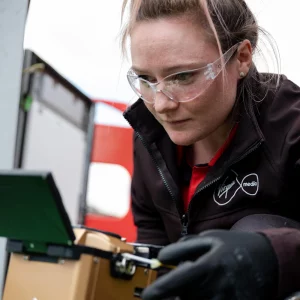Sponsored Links
EU Broadband Grows 20% to 110.5m Connections
Posted: 05th Mar, 2009 By: MarkJ
The European Competitive Telecommunications Association (ECTA) has just published its latest twice-yearly Broadband Scorecard. This tracks European progress on Broadband Penetration and Local Loop Unbunding (LLU) in the 25 member states of Europe.
Broadband connections across the EU rose by 20% over the year, to a total of 110.5m connections, representing 22.5% of Europe's population. Denmark, Finland, Sweden and the Netherlands all had penetration rates exceeding 30%, with the UK (28.1%, up from 24.9% in 2007) not far behind:

Sadly Poland came last with a measly penetration rate of just 10.1%, though Slovakia, Bulgaria and Romania were almost as bad. Meanwhile Incumbents retained 50% of the total retail EU broadband market (including resale) or 45% if resale is excluded.
However the report is also highly critical of healthy operators that have been using the recession as an excuse to "blackmail" policy-makers into relaxing regulation, with the aim of strengthening their own dominant position further at the expense of competition:
To some this might sound an awful lot like what BT has been trying to get Ofcom to do in the UK. BT's £1.5 billion programme plans to rollout fibre-based super-fast broadband to as many as 10 million homes by 2012, which has been made possibly thanks to relaxed regulation. Without public funding it's difficult to see another solution.
Elsewhere next generation fibre optic broadband penetration was at an average of just 0.3% across Europe. Naturally some countries had significantly higher fibre penetration, including Sweden (5.6% population), Estonia (4.9%) and Lithuania (4.2%).
The source of most competition in the EU is unbundling (LLU) of the local loop (44% of all lines supplied by competitors) followed by cable and other parallel infrastructures (36%) with resale and bitstream access accounting for the remainder.
Broadband connections across the EU rose by 20% over the year, to a total of 110.5m connections, representing 22.5% of Europe's population. Denmark, Finland, Sweden and the Netherlands all had penetration rates exceeding 30%, with the UK (28.1%, up from 24.9% in 2007) not far behind:

Sadly Poland came last with a measly penetration rate of just 10.1%, though Slovakia, Bulgaria and Romania were almost as bad. Meanwhile Incumbents retained 50% of the total retail EU broadband market (including resale) or 45% if resale is excluded.
However the report is also highly critical of healthy operators that have been using the recession as an excuse to "blackmail" policy-makers into relaxing regulation, with the aim of strengthening their own dominant position further at the expense of competition:
Innocenzo Genna, Chairman of ECTA, said: "Light touch regulation has not worked in the banking sector and there is no reason to assume it will work to consumers benefit in telecoms. Financial results from incumbents, such as Telefonicas last week, show that they are primarily focused on increasing profitability at the expense of vital infrastructure investment
What is particularly disingenuous is that, at the same time, they are threatening governments and European politicians that they will not invest in next generation access unless there is a relaxation of competition rules that allow rivals to offer services over these networks."
What is particularly disingenuous is that, at the same time, they are threatening governments and European politicians that they will not invest in next generation access unless there is a relaxation of competition rules that allow rivals to offer services over these networks."
To some this might sound an awful lot like what BT has been trying to get Ofcom to do in the UK. BT's £1.5 billion programme plans to rollout fibre-based super-fast broadband to as many as 10 million homes by 2012, which has been made possibly thanks to relaxed regulation. Without public funding it's difficult to see another solution.
Elsewhere next generation fibre optic broadband penetration was at an average of just 0.3% across Europe. Naturally some countries had significantly higher fibre penetration, including Sweden (5.6% population), Estonia (4.9%) and Lithuania (4.2%).
The source of most competition in the EU is unbundling (LLU) of the local loop (44% of all lines supplied by competitors) followed by cable and other parallel infrastructures (36%) with resale and bitstream access accounting for the remainder.
Search ISP News
Search ISP Listings
Search ISP Reviews
Latest UK ISP News








Cheap BIG ISPs for 100Mbps+
150,000+ Customers | View More ISPs
Cheapest ISPs for 100Mbps+
Modest Availability | View More ISPs
Latest UK ISP News
Helpful ISP Guides and Tips
Sponsored Links
The Top 15 Category Tags
- FTTP (6803)
- BT (3882)
- Politics (3076)
- Business (2767)
- Openreach (2664)
- Building Digital UK (2514)
- Mobile Broadband (2476)
- FTTC (2142)
- Statistics (2130)
- 4G (2093)
- Virgin Media (2026)
- Ofcom Regulation (1780)
- 5G (1733)
- Fibre Optic (1604)
- Wireless Internet (1595)
Sponsored
Copyright © 1999 to Present - ISPreview.co.uk - All Rights Reserved - Terms , Privacy and Cookie Policy , Links , Website Rules






























